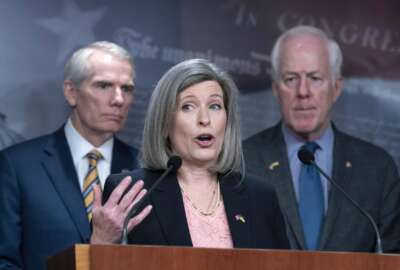
Deleted texts newest reason given to DHS IG to immediately resign
In today's Federal Newscast: Testifying to deleted texts is the latest reason Congressman Bennie Thompson is giving for the immediate resignation of Homeland...
- The top oversight official at the Department of Homeland Security (DHS) is being asked to resign. Two top House Democrats are calling on DHS Inspector General Joseph Cuffari to immediately step down, after he admitted to deleting texts off his government-issued phone. Homeland Security Committee Ranking Member Bennie Thompson (D-Miss.), along with oversight subcommittee ranking member Glenn Ivey (D-Md.), said Cuffari is unfit to lead the IG office. During a hearing earlier this week, Cuffari said he routinely deletes texts off his government phone, but he did not believe those messages constituted federal records. The controversy is just the latest in a string of disputes Cuffari has faced, including his actions surrounding the missing Secret Service texts from Jan. 6.(Letter calling on IG Cuffari to resign - House Homeland Security Committee Democrats)
- The Defense Department's (DoD) weapons acquisitions programs still take too long and continue to exceed cost estimates, problems that ultimately affect military readiness. That is the conclusion from the Government Accountability Office's (GAO) annual report on DoD weapons systems. The report said delays are most commonly driven by problems with supply chains, software, and design. Over half of the 26 major defense acquisition programs GAO assessed, reported new delays. The report recommended that the Pentagon use modular designs to keep pace with advances in technology.
- The Veterans Affairs Department (VA) has a new bite-sized approach to working with contractors. Too often, VA and its contractors implementing technology are at arms length. VA Chief Information Officer Kurt DelBene has a plan to change that. "Thinking of them as integral parts of our team, that are peers of ours. But then keeping that evaluation going and having those engagements, particularly with their leadership to make sure that they're doing the right thing for us. And then changing the kind of projects we drive so that there's less of this big bang, more of that build success upon success," DelBene said. DelBene expects this new approach to lead to better outcomes and more accountability.(The era of ‘big bang’ IT projects at VA is over - Federal News Network)
- The Department of Health and Human Services (HHS) has reached a milestone with its federal union. The National Treasury Employees Union (NTEU) said after a "long and difficult road," the agency's union members ratified a new five-year collective-bargaining agreement. The agreement includes more options for telework and remote work, a student loan reimbursement program, and a broader childcare subsidy program. The agreement will take effect later this summer.(Members ratify new NTEU-HHS contract - National Treasury Employees Union)
- An independent agency created to fast-track the sale of excess federal properties is falling behind on its goals. Congress created the Public Buildings Reform Board in 2016 to recommend federal properties for expedited sale and disposal. The General Services Administration sold 10 of those properties in recent years, and saw nearly $200 million in proceeds. But the board is billions of dollars short of its goal. That is due in part from the Office of Management and Budget (OMB) rejecting the board’s follow-up list of recommendations. The board, before it sunsets, is working on its final round of recommendations for December 2024. (Federal ‘experiment’ to fast-track sale of underutilized property falling behind on goals - Federal News Network)
- After regaining a quorum last March, the Merit Systems Protection Board (MSPB) is still hacking away at its case backlog. The board is getting close to halfway through a massive backlog of appeals cases. The pending cases built up over five years, when the board did not have enough members to issue decisions on federal employee appeals. MSPB's backlog peaked at nearly 3,800 pending cases, when the board first regained a quorum last March. Now, that backlog is down to about 2,200. MSPB said it has been prioritizing decisions on some of the oldest cases first.(Cases decided and cases pending - Merit Systems Protection Board )
- Republicans on the Senate Small Business Committee are leading a bill to set higher standards for a mentorship and training program at the Small Business Administration (SBA). The bill from Committee Ranking Member Joni Ernst (R-Iowa) and Senator Todd Young (R-Ind.) would overhaul SBA’s Service Corps of Retired Executives Program, known as SCORE. The SCORE Act would require mentors involved in the program to undergo annual performance reviews. The bill also takes steps to ensure the SCORE Program is meeting the needs of rural and women-owned small businesses. (Senate Republicans lead bill setting higher standard for SBA mentoring program - Federal News Network)
- Contractors finally have a new timeline for the OASIS+ contract. The General Services Administration (GSA) said it will release the final Request For Proposals (RFP) on or about June 15 for this governmentwide multiple-award professional-services contract. GSA said all six RFPs will be released separately. The agency had hoped to release the OASIS+ solicitation by the end of April, but had to reconsider its approach after a Court of Federal Claims decision upended its plan not to include price as an evaluation factor.(OASIS+ notice - Sam.gov)
- The Small Business Administration (SBA) is getting a new second in command. In a 54-42 vote, the Senate approved Dilawar Syed to serve as deputy SBA administrator. SBA has not had a permanent deputy in nearly five years. Syed currently serves as the special representative for commercial and business affairs at the State Department and also served as chairman of the White House Initiative on Asian Americans and Pacific Islander Economic Growth during the Obama administration. (Senate Press Gallery - @SenatePressGallery)
- Bipartisan legislation in the Senate would make it harder for agencies to rely on a Freedom of Information Act (FOIA) exemption meant to protect trade secrets. Sen. Chuck Grassley (R-Iowa) and several of his colleagues reintroduced the Open and Responsive Government Act this week. The bill sets a higher bar for agencies to withhold information under the confidential commercial information exemption for FOIA. The legislation also explicitly recognizes the nine FOIA exemptions as the only authorities agencies can use to redact information from records.(Grassley, Feinstein, Welch reintroduce bill to restore FOIA presumptions of openness, transparency - Sen. Chuck Grassley (R-Iowa) )
Copyright © 2024 Federal News Network. All rights reserved. This website is not intended for users located within the European Economic Area.
Peter Musurlian
Peter Musurlian is a producer at Federal News Network.
Follow @PMusurlianWFED
Related Stories
Amelia Brust/Federal News Network

Federal ‘experiment’ to fast-track sale of underutilized property falling behind on goals
 First Look
First Look 


